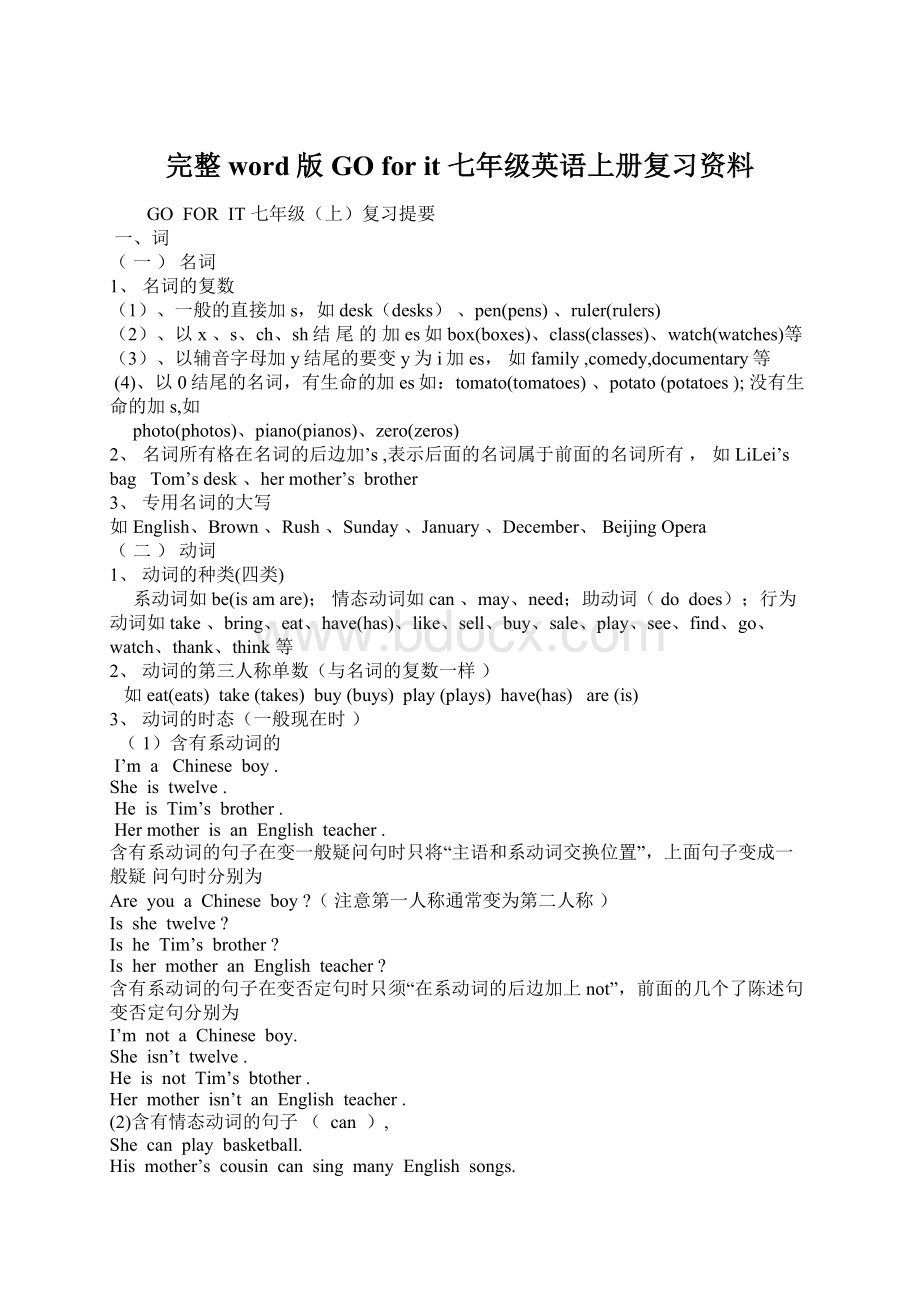完整word版GO for it七年级英语上册复习资料.docx
《完整word版GO for it七年级英语上册复习资料.docx》由会员分享,可在线阅读,更多相关《完整word版GO for it七年级英语上册复习资料.docx(7页珍藏版)》请在冰豆网上搜索。

完整word版GOforit七年级英语上册复习资料
GO FOR IT七年级(上)复习提要
一、词
(一)名词
1、名词的复数
(1)、一般的直接加s,如desk(desks)、pen(pens)、ruler(rulers)
(2)、以x、s、ch、sh结尾的加es如box(boxes)、class(classes)、watch(watches)等
(3)、以辅音字母加y结尾的要变y为i加es,如family,comedy,documentary等
(4)、以0结尾的名词,有生命的加es如:
tomato(tomatoes)、potato(potatoes);没有生命的加s,如
photo(photos)、piano(pianos)、zero(zeros)
2、名词所有格在名词的后边加’s,表示后面的名词属于前面的名词所有,如LiLei’sbag Tom’sdesk、hermother’s brother
3、专用名词的大写
如English、Brown、Rush、Sunday、January、December、BeijingOpera
(二)动词
1、动词的种类(四类)
系动词如be(isamare);情态动词如can、may、need;助动词(do does);行为动词如take、bring、eat、have(has)、like、sell、buy、sale、play、see、find、go、watch、thank、think等
2、动词的第三人称单数(与名词的复数一样)
如eat(eats) take(takes) buy(buys) play(plays) have(has) are(is)
3、动词的时态(一般现在时)
(1)含有系动词的
I’m a Chinese boy.
She is twelve.
He is Tim’s brother.
Hermother is an English teacher.
含有系动词的句子在变一般疑问句时只将“主语和系动词交换位置”,上面句子变成一般疑问句时分别为
Are you a Chinese boy?
(注意第一人称通常变为第二人称)
Is she twelve?
Is he Tim’s brother?
Is her mother an English teacher?
含有系动词的句子在变否定句时只须“在系动词的后边加上not”,前面的几个了陈述句变否定句分别为
I’m not a Chinese boy.
She isn’t twelve.
He is not Tim’s btother.
Her mother isn’t an English teacher.
(2)含有情态动词的句子( can ),
She can play basketball.
His mother’s cousin can sing many English songs.
含有情态动词的句子在变一般疑问句时只须将“主语和情态动词交换位置”,上面两句变一般疑问句分别为
Can she play basketball?
Can his mother’s cousin sing many English songs?
含有情态动词的句子在变否定句时直接在情态动词的后边加上not,上面两个陈述句变否定句分别为
She can not play basketball.
His mother’s cousin can not sing many English songs.
(3)含有行为动词的句子
We have many friends.
They watch TV at 7 in the evening.
The students take their books to school.
I have lunch at school.
You have a sister.
含有行为动词的句子在变一般疑问句时要在原句子的前面加do.上面的句子变成一般疑问句分别为
Do you have many friends?
Do they watch TV at 7 in the evening?
Do the students take their books to school?
Do you have lunch at school?
Do you have a sister?
含有行为动词的句子在变否定句时只须在行为动词前加don’t.上述五个陈述句变否定句分别为
We don’t have many friends.
They don’t watch TV at 7 in the evening.
The students don’t take their books to school.
I don’t have lunch at school.
You don’t have a sister.
含有行为动词的句子,当主语是第三人称单数时,行为动词要加s(或es)如:
She has a red pen.
He has eggs for breakfast.
Her mother buys a skirt for her.
She likes thrillers.
My brother watches TV every evening.
He wants to go to a movie.
含有行为动词的句子,当主语是第三人称单数时,变一般疑问句要“在原句子的前面加上does,同时行为动词要还原”。
上面的句子变成一般疑问句分别为:
Does she have a red pen?
Does he have eggs for breakfast?
Does her mother buy a skirt for her?
Does she like thrillers?
Does your brother watch TV every evening?
Does he want to go to a movie?
含有行为动词的句子,当主语是第三人称单数时,变否定句时“在行为动词前面加does’nt,同时原行为动词要还原”。
上面的句子变否定句分别为:
She doesn’t have a red pen.
He doesn’t have eggs for breakfast.
Hermotherdoesn’t buy a skirt for her.
She doesn’t like thrillers.
My brother doesn’t watch TV every evening.
He doesn’t want to go to a movie.
(三)形容词
本册所学的形容词不多,注意拼法和反义词
big(small) long(short) sad(happy) boring(interesting\funny) exciting difficult
relaxing great healthy old(new) successful white(black)
(四)代词
1、人称代词和物主代词
人称代词 第一人称 第二人称 第三人称
单数 复数 单数 复数 单数 复数
主格 I we you you she\he\it they
宾格 me us you you her\him\it them
物主代词 my our your your her\his\its their
2、指示代词:
this(these) that(those)
3、不定代词 some someone
4、疑问代词 who what howmuch howold (疑问副词:
when where)
5、反身代词 yourself
(五)数量词
1、基数词onetwothreefourfivesixseveneightnineteneleventwelvethirteenfourteen
2、序数词first second third fourth fifth sixth seventh eighth ninth tenth
(六)介词:
本册的介词较少,主要用在介词短语里面,如
on:
onsale(销售)\ onweekends(在周末)\ onApril8th,(在四月八日)\onthedesk(在桌子上)\ onTV(在电视上)\
in:
inEnglish(用英语)\ intheafternoon(在下午) \inthecase(在盒子里)\
T-shirtinred(红色T恤) \beinthemovie(出演这部电影)\inSeptember(在九月)
beinourschoolmusicfestival(参加我们学校的音乐节)
at:
callsb.at3356(拨打3356找某人)\atyourschool(在你们学校里)\atHuaxingClothesStore(在华兴服装店)\ataverygoodprice(以非常优惠的价格)\atsix(六点钟)
havealookat(看一看)
of:
asetof(一串…)\thephotoofyourfamily(你的全家照)\lotsof=alotof(许多)\
dateof birth(birthday)(生日)
with:
withsb.(同某人一起)\begoodwith(和…相处得好)\helpsb.withsth.(帮助某人做某事)
for:
thanksfor=thankyoufor(谢谢某人的….)\ bagforsports(运动包)\pantsfor$30 (卖30元的裤子) \seeforyourself(亲自看看)\forgirls(对女孩子来说)\likesth.forlunch(喜欢吃……当作午餐)
about:
aboutChinesehistory(有关中国历史)
under:
underthedesk(在桌子下面)
(七)副词:
除疑问